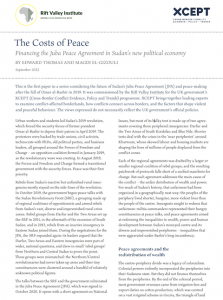This is the first paper in a series considering the future of Sudan’s Juba Peace Agreement (JPA) and peace-making after the fall of Omar al-Bashir in 2019. It was commissioned by the Rift Valley Institute for the UK government’s XCEPT (Cross-Border Conflict Evidence, Policy and Trends) programme. XCEPT brings together leading experts to examine conflict-affected borderlands, how conflicts connect across borders, and the factors that shape violent and peaceful behaviour. The views expressed do not necessarily reflect the UK government’s official policies.

Rethinking Aid in Sudan and South Sudan
The brief draws on a joint convening held in Kampala, Uganda, in November 2025, which brought together more than 45 Sudanese and South Sudanese participants



